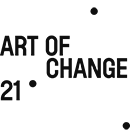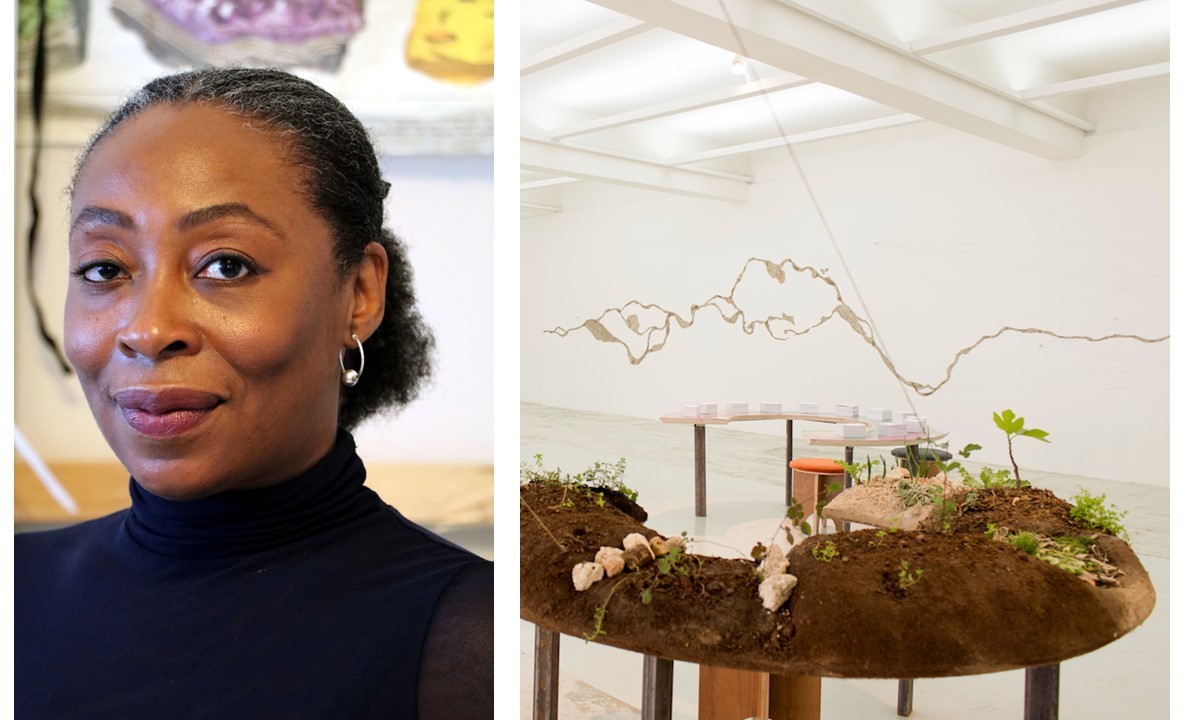Art of Change 21 – How are you feeling and coping with the coronavirus crisis?
Otobong Nkanga – I am in a fog and it still feels too early for me to comment, to put together clear and precise words about it. I experience the situation as if in mourning and I also feel fear. I think of those who live day to day, those whose work provides them with their only livelihood that has been stolen away from them, they will live in an even more difficult situation than they’ve already been experiencing. Venezuela has shown us when a system collapses and what happens when humans are left to fend for themselves, and have nothing left to eat. In these cases, empathy does not go up, it goes down. In Europe, we are fighting to buy toilet paper. I see here in Antwerp aggressive behavior if something happens in a queue. Of course, there are many messages calling for more love and empathy, many gestures too, but this help is punctual and conjunctural – we may give once, twice, ten times, but will we still give a twentieth time to those who will still need it? Look at what is happening on a political level, the situation is used as something to divide more than to foster cooperation. These divisions can get even deeper.
AOC21 – Some players in the art world, especially the big gallerists, say that globalization and acceleration went too far, that the art market must slow down, and they seem to be rediscovering the value of time.
O.N. – But the art world is much bigger than big gallerists. It’s a huge and complex field, with many different players. Some big gallerists feel trapped in this huge globalization and acceleration and now they want to backtrack, but will they do it? To slow down is seen as negative, our mindset is geared to doing what is the opposite of slowing down: action, always more action. Speed things up exponentially sounds more positive than slowing things down. Economy and labor are based on growth. So it’s true, we realize that Covid-19 is a product of this acceleration that we worship, acceleration of consumption, extraction, and we can reach into every corner of the world, as if nothing can escape us, including wild terrain, wild animals… but are we able to stop it? We never take our time: time to care, time to regenerate, not only nature, but people too.
Moreover, many people barely make a living in the art world, and they need work. When big employers are profitable they are also responsible economically to lots of people. Is it an option to slow down when people need a job after this huge crisis? I believe that smaller art galleries will have to explore new possibilities to survive, they will experiment and innovate, and that will bring something new. Change will come from the zeal to survive, more than from a willingness to slow down.
AOC21 – But your own practice includes another relationship with time. You take time to build collective projects, you are a counter-example of the mindset you describe.
O.N. – Time and care are synonymous. Giving care is giving time. This is what I try to carry out and promote in my work. As artists, we take a lot of things from people. We extract, we take, we monetize. But what do we give back? Do we take time to have a relationship with people, with the land? My project Landversation is a conversation builder, it is a process to allow more time, so the relationship and the exchange can exist, and an outcome can come out of it. It’s the same with Carved to Flow. Participatory, collective projects based on communities, are based on time.
AOC21 – So, there is finally hope!
O.N. – Yes, in the awareness that is happening now amongst people! So locally now, we understand better the importance of the soil. So for instance, having a vegetable patch, a piece of land, to ensure that it is healthy in order to better control our food. Hopefully, after the Covid, we will also be better aware of the environment, the importance of taking care of the climate, and biodiversity. We understand better that the way in which we treat our environment can backfire on us.
AOC21 – Has Covid-19 changed your projects, your agenda?
O.N. – Yes it has. My solo exhibition There’s No Such Thing as Solid Ground in Gropius Bau was supposed to open in Berlin on the 30th of April. It has been postponed but not cancelled. My solo show at Henie Onstad in Oslo is postponed too. Not travelling doesn’t bother me. I was born in Nigeria, lived in Lagos, a place where we always had to improvise, where nothing was fully secured, where we always had to find solutions. Dealing with constraints is nothing new to me. As I work in a collaborative manner, I am not indispensable, many people I am working with can continue. If money can travel then everything can move forward.
Otobong Nkanga, chez elle, le 28 avril 2020 par Wim van Dongen / detail from landversation beirut, 2016, installation (foreground), to dig a hole that collapses again, (background)
More information about Otobong Nkanga, here
Conversation with Alice Audouin, April 2020.
Find all the articles from Impact Art News n°18 – April 2020

